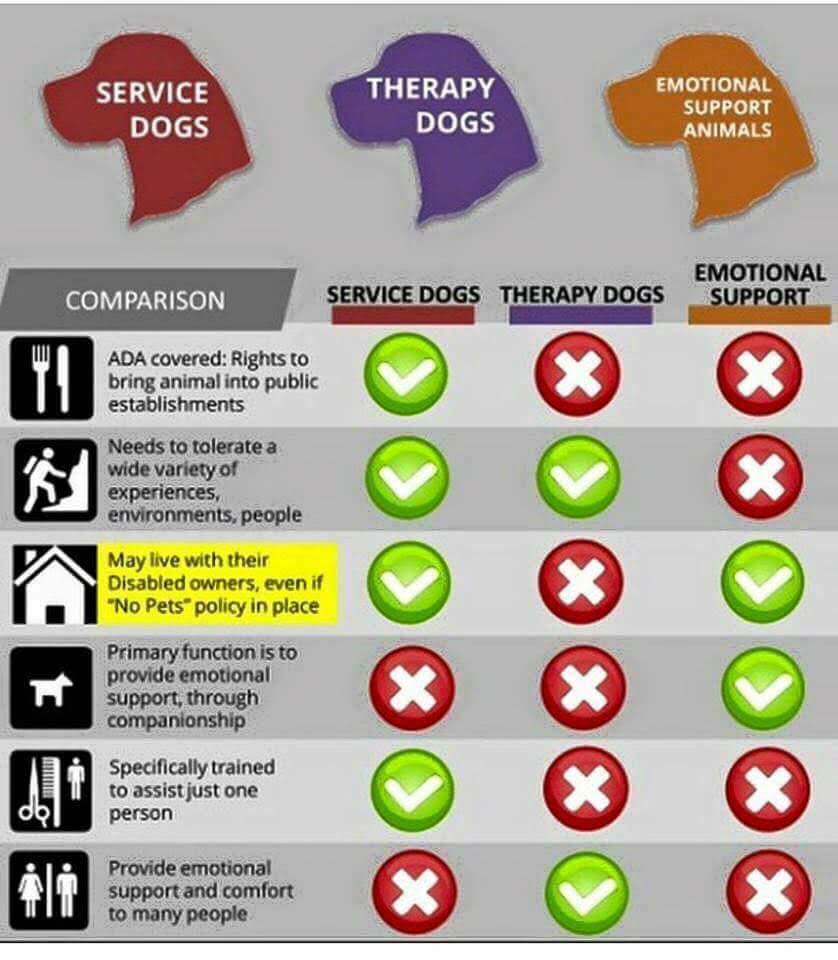Service Animals, Therapy Animals, Emotional Support Animals, Oh My!
Oct 22, 2018 Tracey Aston Training

If you are getting confused by all the different types of
working dog categories, you aren't alone. While some people use the terms
interchangeably, there are many specific differences between Service Animals, Therapy Animals and Emotional Support Animals.
To begin, let's go over the basic definitions. A Service Animal is trained to mitigate the disability of a specific person. Service Animals are protected under the
Americans with Disability Act, and as such are allowed in public places such as
restaurants, grocery stores and hotels. Most people are familiar with Seeing Eye
dogs, but they are just one type of Service Animal. Service Animals can be trained to
alert deaf individuals of sound, diabetics to low glucose numbers, provide seizure
alert to epileptics. Service Animals can
also be trained to do more physically based tasks, such as pulling wheelchairs,
carrying or picking up things for individuals with mobility impairments and
helping with balance. These animals must be
trained and well-behaved in a public setting. Please don't attempt to pet or play with a Service Animal while they are on duty – someone's life could depend on keeping
the animal's attention on them. Most Service Animals will retire at an early age
to become companion animals, as they age faster due to the physical requirements
put upon them. It's ILLEGAL to buy a
vest online and say your dog is a service animal if they are not!
Therapy Animals are trained to provide affection, comfort and
support to those in hospitals, hospice, schools or disaster areas. Therapy Animals provide comfort to groups of people, or provide one-on-one-support to someone
other than their handler. They have
varying roles that can include providing companionship by visiting those in
nursing homes, helping relieve anxiety to those who have been in a natural
disaster or traumatic experience, or helping children gain confidence while
reading aloud to the animal. More recently, Therapy Animals have helped victims of
abuse and family custody hearings, usually children, to testify in court by
providing comfort and support during the court process. Therapy Animals are not
protected under the ADA and are restricted to the specific places they are
visiting and working. Therapy Animals need
to be trained and remain calm around large groups of people in different
environments. There are 3 main therapy pet organizations, Alliance for Therapy Dogs, formerly a known as Therapy Dog
Inc., Therapy Dogs International, and Delta Therapy Dogs. To become a Therapy Animal, a pet must pass a basic 12 step obedience testing, which includes walking
on a loose leash, accepting a treat, being groomed, a greet, sit, down, recall
and a 60 second stay without the owner present.
The animal's handler must re-certify yearly and meet certain guidelines
during the certification. The Therapy Animal's owner must have an ID card, proof of insurance, any needed clearances for
the facility and show up dated vaccinations for their dog.
Emotional Support Animals provide comfort, emotional support for anxiety and depression relief to a specific individual. For an animal to
qualify as an Emotional Support Animal, a psychologist, therapist, or other
mental health professional must certify an individual as emotionally disabled
and state that the animal provides therapeutic value to its owner. Owners MUST carry and be able to present this doctors letter if out in public and provide the proof that the animal is am Emotional Support Animal. Emotional Support Animals are not allowed in the same public places as a service animal
but are allowed to fly on some airlines and to live in housing with a no pets
allowed pet policy. Emotional Support Animals are not trained to perform a
specific task and therefore aren't considered as a service dog. While Emotional Support Animals are not required
to have the training of a service or therapy dog, they should always be trained
in basic obedience, not be animal or people aggressive or reactive to strange
situations. Passing an Emotional Support Animal as a service animal is a federal offense via the Americans with
Disabilities Act.
Having an untrained animal out in public makes it harder for
those who need their dogs. You can be liable for damages or personal injuries
that result from an untrained dog in a public setting. Also, it's a serious
disservice to your animal to put them in situations where they are not trained and
comfortable. Doing so can cause stress for your animal and result in
aggressiveness, breaking your trust bond with your animal or make them run to
avoid the situation, resulting in possible injury to your pet.
As you can see, all of these dogs provide a service, but to
varying degrees. Be respectful of all your local laws, and where the working
animal is and isn't allowed.

















